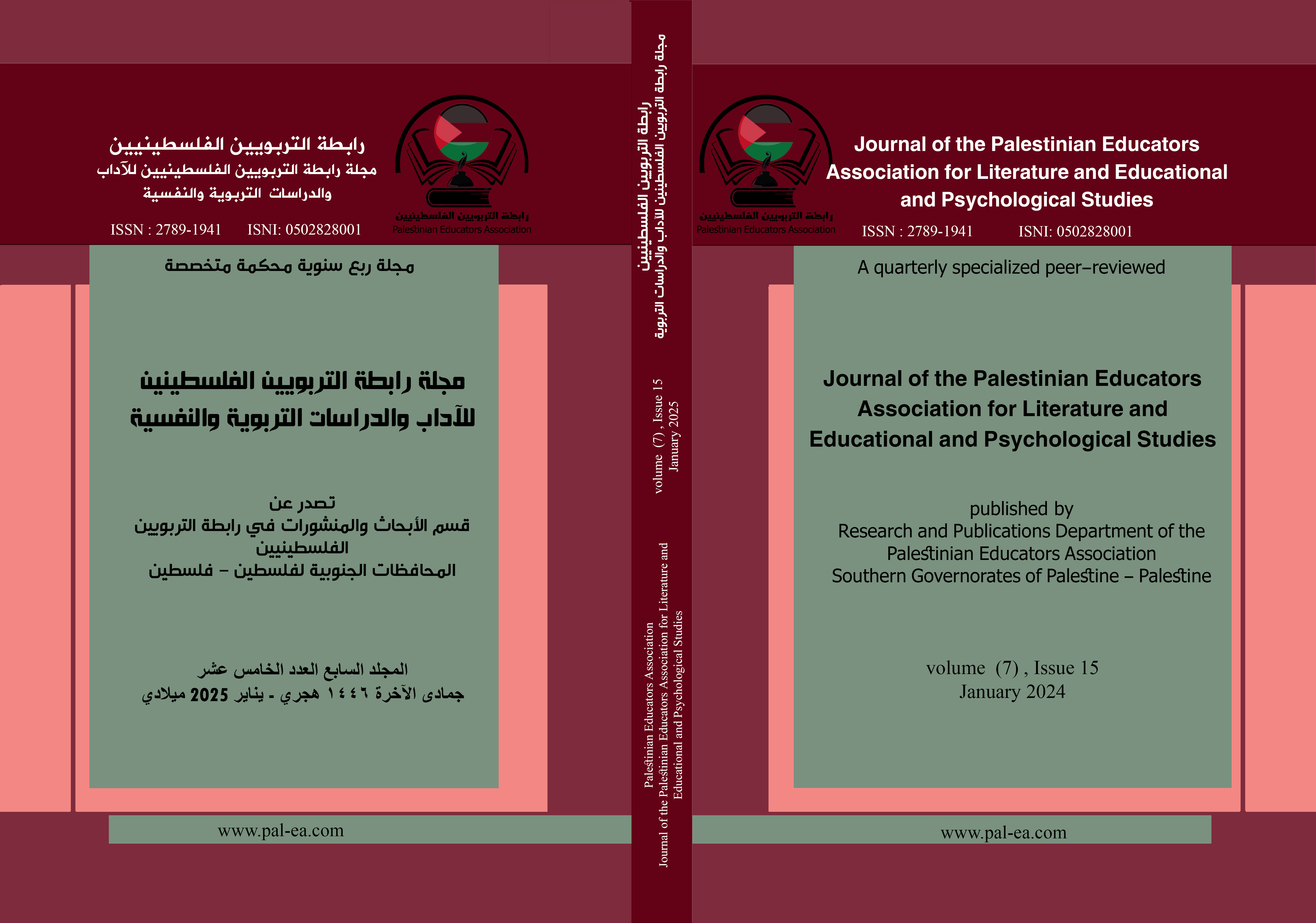"BRIDGES" Educational Initiative: Evaluating the Effectiveness of Free English Language Instruction in the Gaza Strip During Forced Displacement—A Comparative Study on its Impact on Academic Achievement and Psychosocial Adaptation in Prolonged Crisis Contexts
Keywords:
refugees in Gaza, remote learning, crises, educational challengesAbstract
This study evaluates the impact of the "BRIDGES" educational initiative on enhancing English language skills among middle and high school female students in Gaza, amidst the challenges of forced displacement and ongoing humanitarian crises. Launched in September 2023 as a free program in Al-Nasr camp for displaced persons, the initiative combines traditional teaching methods, such as blackboards and pens, with interactive online activities connecting students with native speakers. Using a qualitative descriptive approach, the study analyzed linguistic progress through direct observation. Despite challenges like limited resources, harsh displacement conditions, and a shortage of qualified teachers leading to long waiting lists, the results showed notable improvements in students’ English proficiency, engagement, and sense of inclusion. The study underscores the need for sustainable support to expand the initiative, recommending increased funding, better educational tools, and collaboration with international organizations to ensure educational continuity in conflict zones.
Downloads
References
أولاً: المراجع العربية:
وزارة التربية والتعليم. (2023). The impact of conflict on education in Gaza. تم الاسترجاع من https://www.moehe.gov.ps.
اليونيسف. (2021). التعليم في حالات الطوارئ: التحديات والحلول. تم الاسترجاع من https://www.unicef.org.
الأونروا. (2023). التعليم في الأزمات: حالة قطاع غزة. تم الاسترجاع من https://www.unrwa.org.
الأونروا. (2023). التعليم في غزة: التغلب على حواجز التعلم في مناطق النزاع. التقرير السنوي للأونروا.
اليونيسف. (2021). أطفال غزة: النجاة من الأزمة من خلال التعليم. تم الاسترجاع من https://www.unicef.org.
ثانياً : المراجع العربية الإنجليزية
• UNRWA. (2023). Education in Emergency Situations: The Case of the Gaza Strip. (In Arabic). Retrieved from https://www.unrwa.org.
• UNRWA. (2023). Education in Gaza: Overcoming Barriers to Learning in Conflict Zones. (In Arabic). UNRWA Annual Report.
• UNICEF. (2021). Education in Emergencies: Challenges and Solutions. (In Arabic). Retrieved from https://www.unicef.org.
• UNICEF. (2021). Gaza's Children: Surviving the Crisis Through Education. (In Arabic). Retrieved from https://www.unicef.org.
• Ministry of Education. (2023). The Impact of Conflict on Education in Gaza. (In Arabic). Retrieved from https://www.moehe.gov.ps.
ثالثاً: المراجع الأجنبية:
Ahmad, A., & Vulliamy, E. (2009). In Gaza, the schools are dying too. The Guardian.
Akkari, A. (2004). Education in conflict zones: The case of the Middle East. Journal of Education in Developing Countries, 20(4), 102-121.
Barton, D., & Hamilton, M. (1998). Local literacies: Reading and writing in one community. Routledge.
ESCWA. (2023). Gaza war: Expected socio-economic impacts on the State of Palestine: Preliminary estimations until 5 November 2023. ESCWA and UNDP.
Graham, M. (2011). Rebuilding education in conflict zones: Challenges and opportunities. Palgrave Macmillan.
Hamad, M. (2017). Alternative education in conflict zones. Journal of Crisis Education, 22(3), 135-150.
Hassan, F. (2023). Improving language skills through alternative education in conflict zones. Journal of Language Learning in Crisis.
Hassan, M. (2022). The impact of alternative education on language proficiency among Palestinian refugees. Journal of Education and Social Sciences.
Hicks, D. (2018). Education in emergency situations: A guide for the community. Routledge.
Kirk, J., & Winthrop, R. (2007). Education in emergencies: A developmental perspective. Harvard University Press.
Patrinos, H. A. (2022). Learning loss and learning recovery. Decision, 49(2), 183-188.
Save the Children. (2024). Education in Gaza: A lifeline during crisis. Retrieved from https://www.savethechildren.org.
The Impact of English Language Learning on Communication in Conflict Zones. (2021). International Journal of Language Education, 15(2), 100-120.
UNICEF. (2021). Education in conflict and crisis: The importance of teaching in Gaza. UNICEF Reports.
UNICEF. (2021). Gaza's children: Surviving the crisis through education. Retrieved from https://www.unicef.org.
UNESCO. (2023). The role of language in education during emergencies. Retrieved from https://www.unesco.org.
UNRWA. (2023). Education in Gaza: Overcoming barriers to learning in conflict zones. UNRWA Annual Report.
UNRWA. (2023). Education in emergencies: The case of Gaza. Retrieved from https://www.unrwa.org.
Community-Based Education Models: The Case of Gaza. (2023). Journal of Middle Eastern Education, 12(1), 45-60.
Patrinos, H. A. (2022). Learning loss and learning recovery in conflict areas. Decision, 49(2), 183-188.
Downloads
Published
Issue
Section
License
Copyright (c) 2024 منى ناصر جودة (مؤلف)

This work is licensed under a Creative Commons Attribution-NonCommercial-ShareAlike 4.0 International License.
The Journal of the Palestinian Educators Association for Literature, Educational and Psychological Studies
E-issn: 2789-1941
Authors retain Copyright
The Journal of the Palestinian Educators Association for Literature, Educational and Psychological Studies allows Authors retain Copyright and grant the journal right of first publication with the work simultaneously licensed under a Creative Commons Attribution (CC-BY) 4.0 License that allows others to share the work with an acknowledgment of the work’s authorship and initial publication in this journal.
Provided they are the owners of the Copyright to their work, authors are able to enter into separate, additional contractual arrangements for the non-exclusive distribution of the journal’s published version of the work (e.g., post it to an institutional repository, in a journal or publish it in a book), with an acknowledgment of its initial publication in this journal.
Authors are permitted and encouraged to post their work online (e.g., in institutional repositories, disciplinary repositories, or on their website) prior to
and during the submission process.










